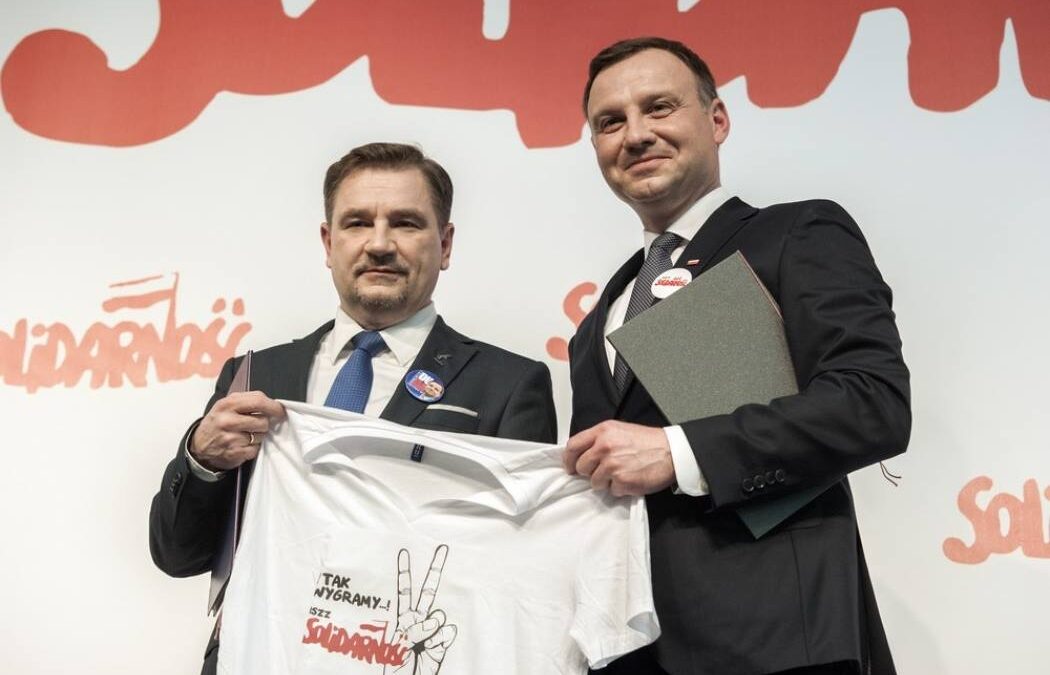Poland’s largest trade union, Solidarity, has endorsed incumbent president Andrzej Duda for re-election, hailing “wonderful cooperation over the past five years” and his support for “worker-friendly” policies.
The union’s leader, Piotr Duda – no relation to the president – also warned that other presidential candidates would seek to reverse the policies supported by Andrzej Duda, which have included a Sunday trading ban, raising the minimal wage and lowering the retirement age.
The endorsement came as Tygodnik Solidarności, the union’s newspaper, named Duda as its Person of the Year – the first serving head of state it has given the award.
“Mr President, Solidarity could always count on you,” said editor-in-chief, Michał Ossowski. “I and the whole of Tygodnik Solidarności want to thank you.”
Najnowszy numer "TS": Prezydent Andrzej Duda Człowiek Roku 2019 „Tygodnika Solidarność”https://t.co/jCgttIacbh pic.twitter.com/U6iNqwhxiM
— Tygodnik Solidarność (@Tysol) June 22, 2020
Ossowski praised the president’s support for policies such as lowering the retirement age and increasing the minimum wage. His newspaper published an interview with the president titled “Why should Poles vote for Andrzej Duda and not Rafał Trzaskowski?”, the main opposition candidate.
“The idea behind Solidarity is to defend the rights of workers for the benefit of building a system of social market economy,” said President Duda after receiving the award. “I took that to heart, and from this stems my good cooperation with Solidarity.”
Piotr Duda called the president a “good man”, and said the award was for “all of our great cooperation over the past five years”. He said he was “certain” that “the cooperation will continue for the next five years,” with the president bidding for a second term at this Sunday’s elections.
Piotr Duda also hit out at Trzaskowski as a “hardened liberal” who would roll back many of the policies that have helped workers. He added that none of the opposition were a “credible” alternative to the incumbent, especially on the retirement age.
This issue has been a political hot potato in Poland. In 2012, Solidarity collected three million signatures for a referendum on the previous Civic Platform-Polish People’s Party government’s plans to raise the retirement age to 67 years, but the proposal was voted down in parliament.
After coming to power in 2015, the current Law and Justice (PiS) party – from which Duda hails – lowered the retirement age back to 60 years for women and 65 for men.
“Trzaskowski cannot escape from this, because he has Civic Platform in his DNA,” said Piotr Duda. “If [President] Duda does not win the elections, the retirement age will be raised.”
Trzaskowski said earlier this week that he no longer supports lowering the retirement age. However, his reversal on the issue – as well as his confusion over whether he had even voted on it in the past – has led critics to say he cannot be trusted.
Following Trzaskowski’s statement, Duda’s campaign announced that they would send a person wearing a “67” costume to all of the opposition candidate’s events as a reminder of the previous government’s decision to raise the retirement age.
.@AdamBielan: Aby R. #Trzaskowski już nigdy nie zapomniał, jak głosował ws. wieku emerytalnego, na każdym jego wiecu będzie gościć nasz bohater – Liczba 67 – wiek emerytalny, jaki wprowadził rząd PO-PSL. pic.twitter.com/9JAMKyd1eK
— #DUDA2020 (@AndrzejDuda2020) June 21, 2020
Since the 1990s, the Solidarity Trade Union (NSZZ Solidarność) has evolved from a 10 million strong anti-communist social movement to a more traditional trade union. It remains Poland’s largest union, though with less than a tenth of its former membership.
Solidarity has often worked closely with the PiS government. It was the initiator, with the support of the influential Catholic church, of a proposal to ban trading on Sundays, a policy that was adopted by the government in 2017.
The union has recently pushed for the ban to be tightened to remove certain loopholes. During the current coronavirus pandemic, it has also protested against proposals to reintroduce shopping on Sundays, saying that “the whole costs of the crisis cannot be thrown onto the shoulders of workers”.
Solidarity has also supported the ruling party’s anti-LGBT campaign. Last year, ahead of parliamentary elections, Tygodnik Solidarności featured a cover suggesting that LGBT is a “neo-Marxist ideology”, with the editor warning that it “attacks Christian values”.
Piotr Duda thanked the Archbishop of Kraków for his homily describing LBGT as a “rainbow plague. It is “important and necessary” to “expose the mechanism of this neo-Marxist ideology”, said Duda.
'Is LGBT a neo-Marxist ideology?' asks the Solidarity union's weekly newspaper.
The editor writes that LGBT groups are 'attacking Christian values' and 'calling for discrimination against those who think differently'.
An interviewee says they are committing 'symbolic violence'. pic.twitter.com/2nJbxNPXZh
— Notes from Poland 🇵🇱 (@notesfrompoland) September 22, 2019
Main image credits: Solidarność/Facebook

Maria Wilczek is deputy editor of Notes from Poland. She is a regular writer for The Times, The Economist and Al Jazeera English, and has also featured in Foreign Policy, Politico Europe, The Spectator and Gazeta Wyborcza.




















